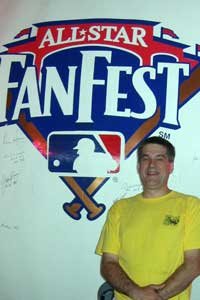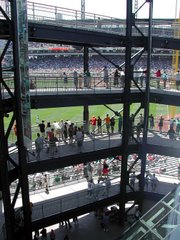Prior to the 1883 season, the National League put a franchise in Philadelphia, figuring a team in what then was America's second-largest city would fare better financially than the club it was replacing in Worcester, Mass.
The Philadelphia squad got off to a rocky start, to say the least. The Quakers, as they originally were called, played 98 games and lost 81 of them, giving up more than twice as many runs as they scored. Taking the pitcher's mound in a majority of games was a 20-year-old rookie named John Francis Coleman, who must have had either a strong sense of loyalty or a strong sense of humor: He surrendered 772 hits and 510 runs for the season while going 12-48.
The team became better known as the Phillies, but in 124 years its situation has rarely gotten all that much better. Besides a couple of isolated pennants, a dozen or so years of consistent winning and the magical season of 1980, the Phils have been associated with losing throughout most of their history.
And they're about to rack up their 10,000th loss as a franchise, an occasion some Philadelphians no doubt will celebrate in some kind of perverse tribute to the city's general sense of ineptitude.
Personally, I've always had a warm spot for Philly. My grandparents lived in the suburbs, just outside the city limits, and many of my fondest childhood memories are from there. Some of my earliest, too; I remember a visit to the Philadelphia Zoo in 1965 and still feel the pain of seeing the helium balloon I got there float away just as I was about to show it to my great-grandmother.
I'm too young, though, to remember what happened in Philadelphia in 1964, when the Phillies committed The Choke. For anyone who was there, the numbers still are agonizing four decades later: a 6.5-game lead on Sept. 20, with just 12 games to go, then 10 losses in a row and a tie for second place. My dad says that after one of those defeats, he was so disgusted that he threw his radio out the window.
My own memories of the Phillies start when they were lousy again, around 1970, when they used to give away 8-by-10 glossies of the players at the gas station (along with free road maps and guys checking your oil, all at 33 cents per gallon). So I ended up with a bunch of nice photos of the likes of Deron Johnson, Barry Lersch, Woodie Fryman and Byron Browne.
None of that meant much of anything to me until 1972, when everyone was talking about a new Phillies pitcher, Steve Carlton, who refused to lose. By the end of the year, he had racked up 27 wins for a team that posted a grand total of 59 victories, as far as I'm concerned the most remarkable accomplishment in baseball history.
By the following season, I listened to Phillies games on the radio every night, rapidly building enthusiasm for a team that managed, once again, to finish last.
In 1974, the situation started to look promising, with second baseman Dave Cash coming from the rival Pirates to provide a needed burst of energy and young third baseman Mike Schmidt leading the league in home runs while raising his batting average nearly 100 points.
The Phillies rose from third in '74 to second in '75 to their first National League East title during the Bicentennial. Three straight divisional championships, though, provided more frustration for long-suffering fans: Philadelphia faltered in the playoffs each fall.
Then came 1980, and as a freshman in college, I watched the Phillies finally put it all together. First was the playoff win over Houston, in which the final four games all went to extra innings. Then came the World Series against Kansas City, which had exorcised its own demons by finally beating the Yankees in the Royals' fourth try.
I've seen the deciding sixth game several times, but only on videotape. While it was being played live, I was obligated to be somewhere besides in front of a TV screen. That's the way it goes sometimes.
The strike of '81 started to erode my interest in baseball in general, and the Phillies in particular. I was attending school on the other side of Pennsylvania and had a whole lot else going on in my life.
I watched the "Wheeze Kids," featuring aging members of the '70s Big Red Machine, somehow make it to the '83 Series, only to be humiliated by Baltimore. A few years later, I was living in Pittsburgh and started the gradual process of switching my allegiance. (Oh, why didn't I move to Minneapolis?)
One like still remained from my years of following the Phillies: Schmidt, who in early 1987 was closing in on 500 home runs, which was a huge deal in the pre-steroid era. The Phillies happened to be visiting Three Rivers Stadium for a weekend series with Schmidt at 498. I saw him hit a home run on Friday night, then I returned for Saturday, April 18.
Steve Bedrosian had just coughed up a lead and the Phillies trailed, 6-5, going into the top of the eighth inning. The Phils got two runners aboard, and Don Robinson ran a 3-0 count on Schmidt. At that point, I figured I'd have to come back the next day, but Schmidt smacked the ball over the left-field wall, not only for No. 500 but to win the game for Philadelphia.
On April 23, 1989, I attended another Phillies-vs.-Pirates game at Three Rivers. Schmidt, now 38 years old, came to bat in the first inning against John Smiley and smashed the ball over the left-field wall.
"He always hits a homer when I see him!" I said to my companions as I stood and clapped.
Turns out that I never saw him in person again. A month later, mired in a slump, Schmidt announced his retirement. After that home run in Pittsburgh, he hit only one more, No. 548.
As for the Phillies, I cheered when they beat the Braves in the '93 playoffs, and I turned off the television when manager Jim Fregosi brought Mitch "Wild Thing" Williams in to pitch late in the sixth game of the World Series. I had a feeling about what might happen.
And that was about it. I don't have a rooting interest anymore in the team I loved as a kid, which is kind of a shame.
Then again, I probably shouldn't admit I used to love a team that's about to lose its 10,000th game.
Monday, July 9, 2007
Subscribe to:
Post Comments (Atom)









No comments:
Post a Comment